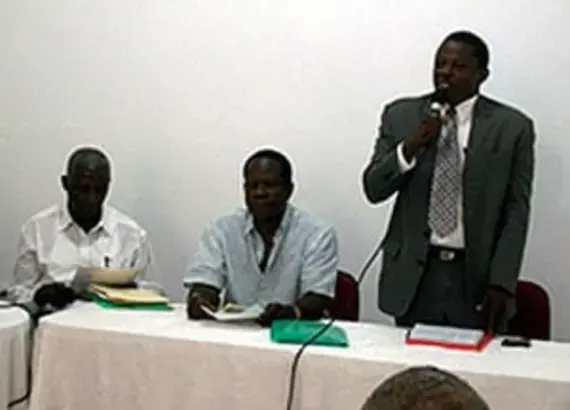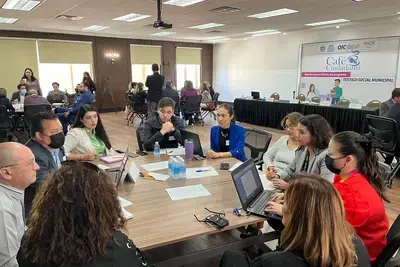
Success Story
In Haiti, Citizens Voice Ideas and Concerns about Rebuilding
How do you rebuild from an earthquake that flattens infrastructure, leaves 1.5 million people homeless and kills more than 230,000?
The Action Plan for National Recovery and Development of Haiti seeks to answer this question and views last January's earthquake as "a window of opportunity." The draft plan spans the next 10 years and includes detailed plans for rebuilding infrastructure, water and sanitation systems; expanding housing and the labor market; and improving education, healthcare and democratic institutions.
"Nobody has been spared, and no one can pick themselves up again alone," the plan states in its introduction. "We must build on this new solidarity which is expected to trigger profound changes in behavior and attitudes."
Key factors in helping to move the plan forward will be enlisting the cooperation and support of Haitian communities and individual citizens and providing them an opportunity to add their input.
One avenue for this kind of involvement is Haiti's initiative committees (ICs). Developed more than a decade ago with NDI support, the ICs have operated in 179 municipalities across the country and involve 35,000 Haitians and 3,500 civic organizations, including 400 women's groups. Before the earthquake, the IC network organized communities to conduct damage assessments after hurricanes, repair roads, facilitate medical treatment, provide potable water, and promote transparency in government development projects.
Now, ICs are coordinating a series of presentations on the action plan so their members — along with other members of the Haitian public, mayors, town council members and other local government officials — can learn the details, ask questions and add their own suggestions.
Meetings have been held around the country and are structured to address general topic areas such as agriculture, infrastructure, education and tourism. After a government official presents details of the plan, attendees split into groups depending on their interest or expertise, and then collaborate on ideas and suggestions for their particular topic. They present their suggestions to the group, and the comments are recorded by IC members so they can be incorporated into a document that will highlight a community’s priorities for reconstruction.
 Haitian citizens listen to the presentation of the plan in Les Cayes.
Haitian citizens listen to the presentation of the plan in Les Cayes.Recently, an IC in Les Cayes, a port city on the southern peninsula, brought community members together to review the plan. Silien Mimose, speaking on behalf of area women's groups, emphasized the need to incorporate women into all aspects of reconstruction. Délimont Jean Luckner, speaking for educators, questioned the country's ability to implement universal and free public education, given the government's education track record before the earthquake. He pointed out that the school year was scheduled to begin a week after the meeting, but that no efforts had been made to open schools or reach out to homeless or displaced parents.
These dialogues are part of a larger effort that includes information sessions, communal- and departmental-level town hall meetings and regional forums to increase citizen understanding and participation in the National Plan for Reconstruction. After participating in the dialogues, IC members will work with citizens in their communities to form follow-up committees to monitor progress of reconstruction projects being carried out by local and national government in their communities.
Related:
Pictured above: A presenter at the IC meeting in Les Cayes
Published October 12, 2010



